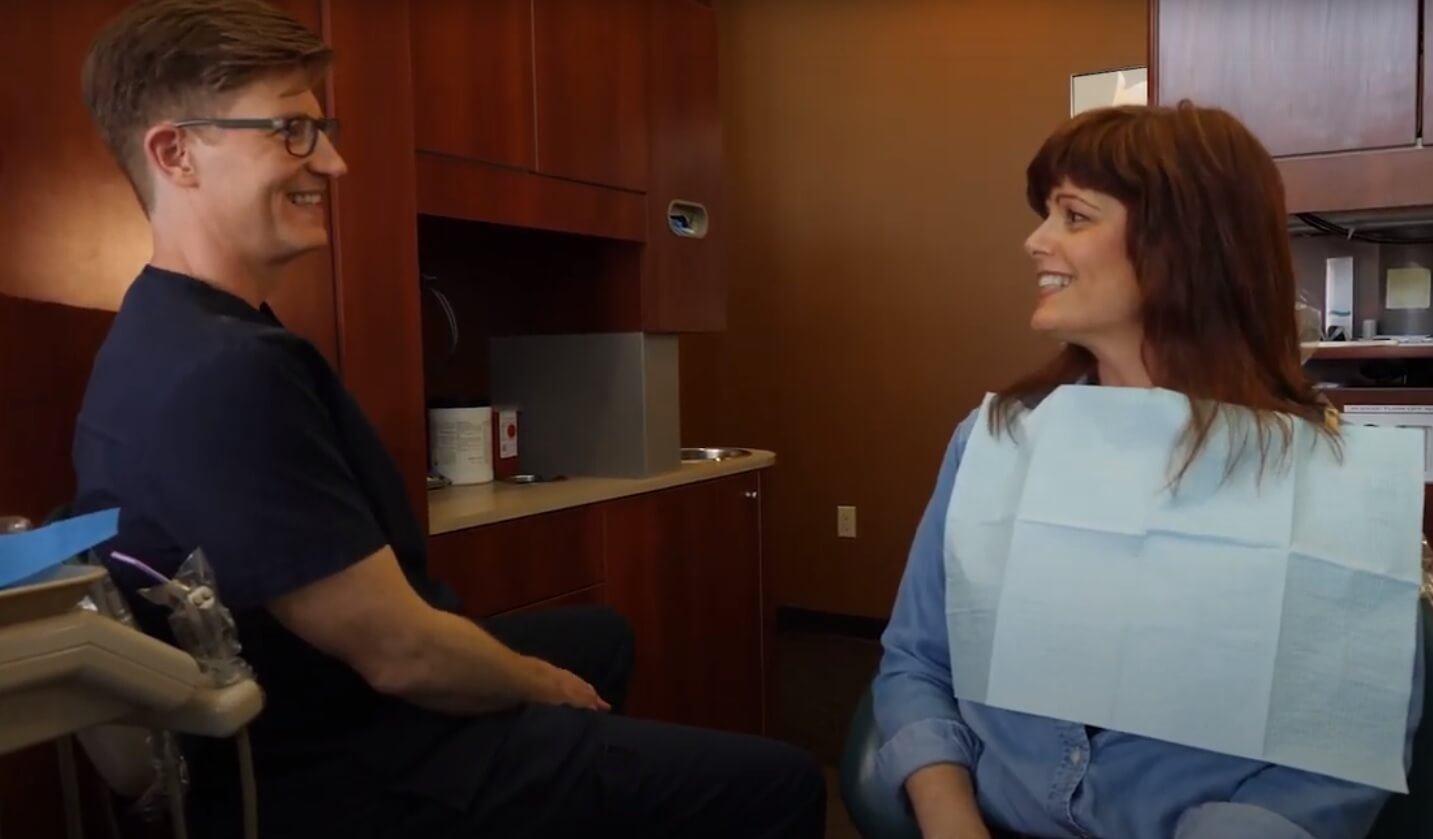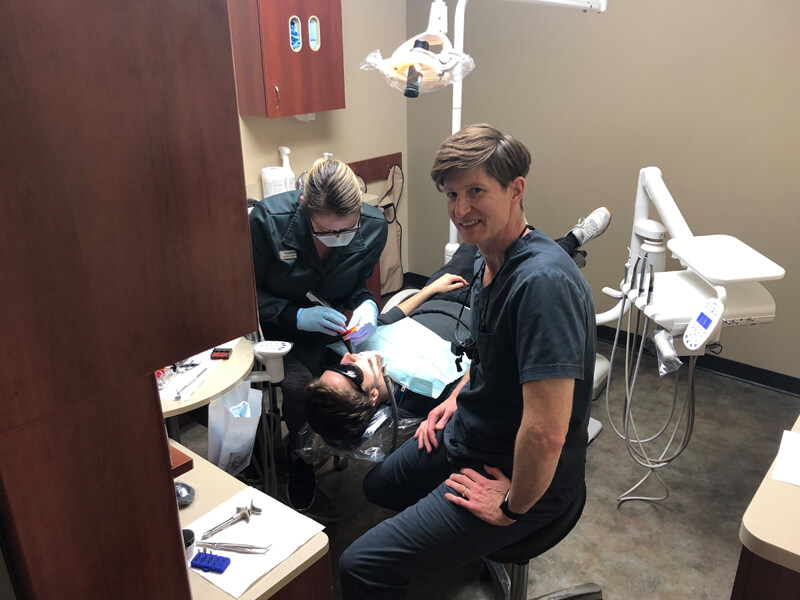TMJ & TMD Treatments
Stop your pain at the source.
Ask any sufferer, and they will tell you temporomandibular joint pain can affect your whole life. Sometimes more than a bit of pain in the face, temporomandibular joint pain can be a day-ending distraction.
Temporomandibular disorder is the official name for nerve pain or pain caused by inflammation of the temporomandibular joint, the hinge joint that lets your jaw open and close. It can manifest as pain in the face, headaches, or even pain in and around the ears.
Contact Soundview Family Dental today! We can help.


Temporomandibular joint dysfunction
There are several known causes of temporomandibular joint disorder (TMJ). Injury to the joint can cause long or short-term pain. Grinding of the teeth can aggravate an already tender joint. Age-related conditions like arthritis or rheumatoid arthritis are known joint irritants. Even overextending the jaw can cause temporary pain.
TMJ can last for a short period of time, like days or weeks, or it can last for years. Home treatment includes ice, rest, and over-the-counter pain relievers like Tylenol or Ibuprofen.
When home remedies aren’t enough for meaningful relief, come visit our office. We are able to assist with long-term temporomandibular disorders based on the cause of the pain.
Let us care for your smile!
Schedule an appointment with us today
Benefits of
TMJ & TMD treatments
Are you experiencing pain or discomfort in your jaw? You may be suffering from temporomandibular joint (TMJ) or temporomandibular disorder (TMD). Luckily, there are treatments available to help alleviate your symptoms. Here are some benefits of seeking out TMJ and TMD treatments:
Reducing Pain
With TMJ and TMD treatments, you can experience a reduction in pain and discomfort in your jaw and surrounding areas.
Improving Functionality
TMJ and TMD treatments can help improve the functionality of your jaw, allowing you to eat, speak, and smile with ease.
Preventing Long-Term Damage
Without treatment, TMJ and TMD can cause long-term damage to your jaw, leading to chronic pain and further dental issues.
Non-Invasive Options
Many TMJ and TMD treatments are non-invasive, such as exercises and lifestyle changes, allowing you to avoid surgery.
Personalized Treatment Plans
Your dentist will work with you to develop a personalized treatment plan that fits your unique needs, ensuring the best possible outcome for your situation.
No need to suffer from constant joint pain
Often, the use of a simple mouthguard at night to prevent the damage of nighttime grinding will give marked relief. A professionally fitted dental mouthguard will be more comfortable and better suited to your exact needs than a stock mouthguard you found at the local drugstore or ordered off the internet. If the cause of the pain is related to an injury or arthritis we may be able to make recommendations to soothe your discomfort or we may be able to refer you to a specialist for additional treatment based on the cause of the pain. Physical therapy focused on relaxing and strengthening the muscles attached to the jaw can sometimes provide relief, as can therapies that stop grinding and clenching habits.
There is no need to suffer from constant joint pain. Come see us for a consultation on how we can best assist you in your quest for a pain-free life.
Our guarantee
Our office provides personalized and effective TMJ & TMD treatments to help you relieve pain and discomfort associated with jaw joint disorders. Dr. Kitts, our skilled dentist, and our team use the latest technology and techniques, including oral appliances and BOTOX® injections, to treat TMJ & TMD and improve your quality of life. We will carefully evaluate your jaw joint and recommend the best course of action to meet your unique needs. Our friendly and compassionate team is dedicated to providing you with a comfortable and stress-free experience.
Contact us
If you have any questions about TMJ or would like to schedule a visit with your Edmonds dentist, Dr. Eric Kitts. Give us a call or request an appointment online today!
FAQ
What is the difference between TMJ and TMD?
What are the common symptoms of TMD?
Common symptoms of TMD include:
- Jaw pain or tenderness.
- Difficulty opening or closing your mouth.
- Clicking or popping sounds when opening or closing your mouth.
- Locking of the jaw.
- Earaches or ringing in the ears.
- Headaches or migraines.
- Facial pain or discomfort.
What causes TMD?
There are several factors that can contribute to the development of TMD, including:
- Jaw injury or trauma.
- Teeth grinding (bruxism) or clenching.
- Arthritis in the TMJ.
- Misaligned teeth or bite.
- Stress, which can cause muscle tension and jaw clenching.
- Dislocation or erosion of the joint’s cushioning disc.
What are the treatment options for TMD?
Treatment options for TMD vary depending on the underlying cause and severity of the condition. Some common treatments include:
- Pain management: Over-the-counter pain relievers, ice packs, or moist heat can help alleviate discomfort.
- Bite guards or splints: These custom-made devices are worn to reduce teeth grinding and clenching and help realign the jaw.
- Physical therapy: Exercises and stretching can help strengthen and relax the jaw muscles.
- Relaxation techniques: Reducing stress and learning relaxation techniques can help manage muscle tension and jaw clenching.
- Dental treatments: Correcting misaligned teeth or addressing other dental issues may help relieve TMD symptoms.
In rare cases, surgical intervention may be necessary if conservative treatments are not effective.
How can I prevent TMD?
While not all cases of TMD can be prevented, you can take steps to reduce your risk:
- Practice good posture and avoid resting your chin on your hand.
- Maintain a balanced diet to reduce stress on the jaw muscles.
- Limit hard, crunchy, or chewy foods that put stress on the jaw.
- Avoid excessive gum chewing.
- Learn relaxation techniques to manage stress and reduce jaw clenching.
- Seek dental treatment for any underlying issues, such as misaligned teeth or teeth grinding.
- Wear a mouthguard during sports or physical activities to protect the jaw from injury.
Our general dentistry services
Cleanings • Root Canals • Fillings • Emergency Care • Hygiene • Oral Cancer Screening • Pediatrics • Periodontics • Receding Gum Treatment • TMJ/TMD • Mouthguards • Sleep Apnea • Comfort First

